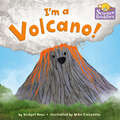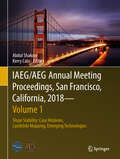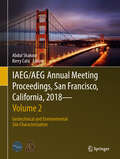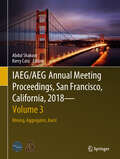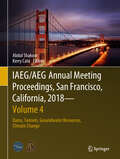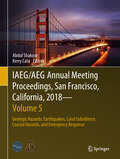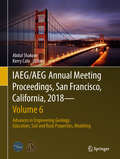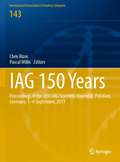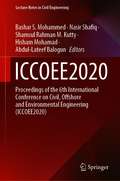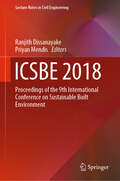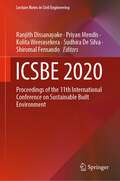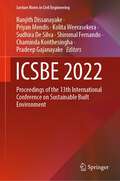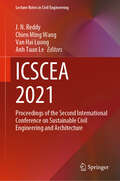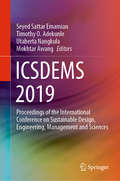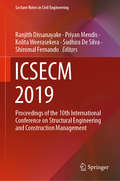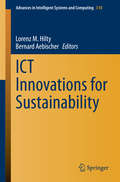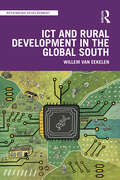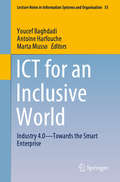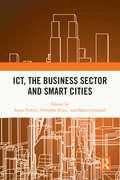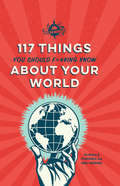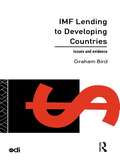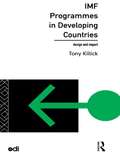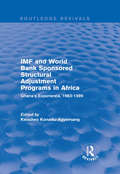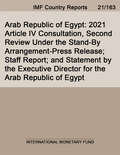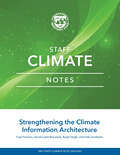- Table View
- List View
I'm a Volcano! (Science Buddies #2)
by Bridget HeosIn the second installment of the Science Buddies series, a volcano takes young readers through the fascinating formation and life of an active volcano--cool! I mean, hot!How do volcanoes form? What makes them erupt? Are there different kinds? Hi, I&’m Volcano! And I'm here to answer all your burning questions! In friendly, simple text and with funny, engaging, and informative illustrations, a young volcano will teach readers everything there is to know about these exploding wonders. And while volcanoes can be a bit scary, kids will learn that they are carefully monitored and that they give us a lot of beautiful things too! I guess you could say there is a lot to lava about volcanoes!
IAEG/AEG Annual Meeting Proceedings, San Francisco, California, 2018 - Volume 1: Slope Stability: Case Histories, Landslide Mapping, Emerging Technologies
by Abdul Shakoor Kerry CatoThis book is one out of six IAEG XIII Congress and AEG 61st Annual Meeting proceeding volumes, and deals with topics related to slope stability including case histories, landslide mapping, and emerging technologies. The theme of the IAEG/AEG Meeting, held in San Francisco from September 17-21, 2018, is Engineering Geology for a Sustainable World. The meeting proceedings analyze the dynamic role of engineering geology in our changing world. The meeting topics and subject areas of the six volumes are: Slope Stability: Case Histories, Landslide Mapping, Emerging Technologies; Geotechnical and Environmental Site Characterization; Mining, Aggregates, Karst; Dams, Tunnels, Groundwater Resources, Climate Change; Geologic Hazards: Earthquakes, Land Subsidence, Coastal Hazards, and Emergency Response; and Advances in Engineering Geology: Education, Soil and Rock Properties, Modeling.
IAEG/AEG Annual Meeting Proceedings, San Francisco, California, 2018 - Volume 2: Geotechnical and Environmental Site Characterization
by Abdul Shakoor Kerry CatoThis book is one out six IAEG XIII Congress and AEG 61st Annual Meeting proceeding volumes, and deals with topics related to the geotechnical and environmental site characterization. The theme of the IAEG/AEG Meeting, held in San Francisco from September 17-21, 2018, is Engineering Geology for a Sustainable World. The meeting proceedings analyze the dynamic role of engineering geology in our changing world. The meeting topics and subject areas of the six volumes are: Slope Stability: Case Histories, Landslide Mapping, Emerging Technologies; Geotechnical and Environmental Site Characterization; Mining, Aggregates, Karst; Dams, Tunnels, Groundwater Resources, Climate Change; Geologic Hazards: Earthquakes, Land Subsidence, Coastal Hazards, and Emergency Response; and Advances in Engineering Geology: Education, Soil and Rock Properties, Modeling.
IAEG/AEG Annual Meeting Proceedings, San Francisco, California, 2018 - Volume 3: Mining, Aggregates, Karst
by Abdul Shakoor Kerry CatoThis book is one out six IAEG XIII Congress and AEG 61st Annual Meeting proceeding volumes, and deals with topics related to mining, aggregates, and karst. The theme of the IAEG/AEG Meeting, held in San Francisco from September 17-21, 2018, is Engineering Geology for a Sustainable World. The meeting proceedings analyze the dynamic role of engineering geology in our changing world. The meeting topics and subject areas of the six volumes are: Slope Stability: Case Histories, Landslide Mapping, Emerging Technologies; Geotechnical and Environmental Site Characterization; Mining, Aggregates, Karst; Dams, Tunnels, Groundwater Resources, Climate Change; Geologic Hazards: Earthquakes, Land Subsidence, Coastal Hazards, and Emergency Response; and Advances in Engineering Geology: Education, Soil and Rock Properties, Modeling.
IAEG/AEG Annual Meeting Proceedings, San Francisco, California, 2018 - Volume 4: Dams, Tunnels, Groundwater Resources, Climate Change
by Abdul Shakoor Kerry CatoThis book is one out of six IAEG XIII Congress and AEG 61st Annual Meeting proceeding volumes, and deals with topics related to dams, tunnels, groundwater resources, and climate change. The theme of the IAEG/AEG Meeting, held in San Francisco from September 17-21, 2018, is Engineering Geology for a Sustainable World. The meeting proceedings analyze the dynamic role of engineering geology in our changing world. The meeting topics and subject areas of the six volumes are: Slope Stability: Case Histories, Landslide Mapping, Emerging Technologies; Geotechnical and Environmental Site Characterization; Mining, Aggregates, Karst; Dams, Tunnels, Groundwater Resources, Climate Change; Geologic Hazards: Earthquakes, Land Subsidence, Coastal Hazards, and Emergency Response; and Advances in Engineering Geology: Education, Soil and Rock Properties, Modeling.
IAEG/AEG Annual Meeting Proceedings, San Francisco, California, 2018 - Volume 5: Geologic Hazards: Earthquakes, Land Subsidence, Coastal Hazards, And Emergency Response
by Abdul Shakoor Kerry CatoThis book is one out of six IAEG XIII Congress and AEG 61st Annual Meeting proceeding volumes, and deals with topics related to geologic hazards, such as earthquakes, land subsidence, coastal hazards, and the emergency response. The theme of the IAEG/AEG Meeting, held in San Francisco from September 17-21, 2018, is Engineering Geology for a Sustainable World. The meeting proceedings analyze the dynamic role of engineering geology in our changing world. The meeting topics and subject areas of the six volumes are: Slope Stability: Case Histories, Landslide Mapping, Emerging Technologies; Geotechnical and Environmental Site Characterization; Mining, Aggregates, Karst; Dams, Tunnels, Groundwater Resources, Climate Change; Geologic Hazards: Earthquakes, Land Subsidence, Coastal Hazards, and Emergency Response; and Advances in Engineering Geology: Education, Soil and Rock Properties, Modeling.
IAEG/AEG Annual Meeting Proceedings, San Francisco, California, 2018—Volume 6: Advances in Engineering Geology: Education, Soil and Rock Properties, Modeling
by Abdul Shakoor Kerry CatoThis book is one out of six IAEG XIII Congress and AEG 61st Annual Meeting proceeding volumes, and deals with topics related to the advances made in engineering geology with emphasis on education, soil and rock properties, and modeling. The theme of the IAEG/AEG Meeting, held in San Francisco from September 17-21, 2018, is Engineering Geology for a Sustainable World. The meeting proceedings analyze the dynamic role of engineering geology in our changing world. The meeting topics and subject areas of the six volumes are: Slope Stability: Case Histories, Landslide Mapping, Emerging Technologies; Geotechnical and Environmental Site Characterization; Mining, Aggregates, Karst; Dams, Tunnels, Groundwater Resources, Climate Change; Geologic Hazards: Earthquakes, Land Subsidence, Coastal Hazards, and Emergency Response; and Advances in Engineering Geology: Education, Soil and Rock Properties, Modeling.
IAG 150 Years
by Chris Rizos Pascal WillisThis proceedings contains a selection of peer-reviewed papers presented at the IAG Scientific Assembly, Postdam, Germany, 1-6 September, 2013. The scientific sessions were focussed on the definition, implementation and scientific applications of reference frames; gravity field determination and applications; the observation and assessment of earth hazards. It presents a collection of the contributions on the applications of earth rotations dynamics, on observation systems and services as well as on imaging and positioning techniques and its applications.
ICCOEE2020: Proceedings of the 6th International Conference on Civil, Offshore and Environmental Engineering (ICCOEE2020) (Lecture Notes in Civil Engineering #132)
by Bashar S. Mohammed Nasir Shafiq Shamsul Rahman M. Kutty Hisham Mohamad Abdul-Lateef BalogunThis book contains papers presented in the 6th International Conference on Civil, Offshore & Environmental Engineering (ICCOEE2020) under the banner of World Engineering, Science & Technology Congress (ESTCON2020) will be held from 13th to 15th July 2021 at Borneo Convention Centre, Kuching, Sarawak, Malaysia. This proceeding contains papers presented by academics and industrial practitioners showcasing the latest advancements and findings in civil engineering areas with an emphasis on sustainability and the Industrial Revolution 4.0. The papers are categorized under the following tracks and topics of research:1. Resilient Structures and Smart Materials2. Advanced Construction and Building Information Modelling3. Smart and Sustainable Infrastructure4. Advanced Coastal and Offshore Engineering5. Green Environment and Smart Water Resource Management Systems
ICSBE 2018: Proceedings of the 9th International Conference on Sustainable Built Environment (Lecture Notes in Civil Engineering #44)
by Ranjith Dissanayake Priyan MendisThis book highlights current research and development in the area of sustainable built environments, currently one of the most important disciplines in civil engineering. It covers a range of topics, including sustainable construction and infrastructures, waste and wastewater management, enhanced sustainability, renewable and clean energy, sustainable materials and industrial ecology, building automation and virtual reality, and impact of climate change. As such it provides vital insights into responsible urbanization practices, and new tools and technologies in civil engineering that can mitigate the negative effects of the built environment.
ICSBE 2020: Proceedings of the 11th International Conference on Sustainable Built Environment (Lecture Notes in Civil Engineering #174)
by Ranjith Dissanayake Priyan Mendis Kolita Weerasekera Sudhira De Silva Shiromal FernandoThis book highlights the latest knowledge and innovations in the field of civil engineering and construction industry striving for a sustainable built environment. It includes recent innovative findings from the proceedings of the 11th ICSBE 2020 under the themes of sustainable tall buildings, sustainable bridge construction and maintenance, waste in construction industry, sustainable manufacturing and recycling, disaster risk reduction for sustainable built environment, green innovations and entrepreneurship, sustainable water management in developing countries, water pollution and CKDu, sustainable urban environment and social well-being, and many greener and sustainable resource and energy-efficient innovative research findings.
ICSBE 2022: Proceedings of the 13th International Conference on Sustainable Built Environment (Lecture Notes in Civil Engineering #362)
by Ranjith Dissanayake Priyan Mendis Kolita Weerasekera Sudhira De Silva Shiromal Fernando Chaminda Konthesingha Pradeep GajanayakeThis book highlights the latest knowledge and innovations in the fields of civil engineering and construction industry striving for a sustainable built environment. It consists of high quality and innovative research findings selected from the proceedings of the 13th ICSBE 2022 under the themes of sustainable construction, urban green infrastructure and planning, rainwater harvesting and water conservation, high-performance concrete, indoor environmental quality and indoor plants, wind and hydro-power energy, waste and wastewater management for enhanced sustainability, impacts of climate change, carbon footprint, global climate model and landscaping, material flows and industrial ecology, sustainable materials, etc.
ICSCEA 2021: Proceedings of the Second International Conference on Sustainable Civil Engineering and Architecture (Lecture Notes in Civil Engineering #268)
by J. N. Reddy Chien Ming Wang Van Hai Luong Anh Tuan LeThis book presents articles from the Second International Conference on Sustainable Civil Engineering and Architecture, held on 30 October 2021 in Ho Chi Minh City, Vietnam. The conference brings together international experts from both academia and industry to share their knowledge, expertise, to facilitate collaboration and improve cooperation in the field. The book highlights the latest advances in sustainable architecture and civil engineering, covering topics such as offshore structures, structural engineering, construction materials, and architecture.
ICSDEMS 2019: Proceedings of the International Conference on Sustainable Design, Engineering, Management and Sciences
by Mokhtar Awang Seyed Sattar Emamian Timothy O. Adekunle Utaberta NangkulaThis book gathers selected papers from the International Conference on Sustainable Design, Engineering, Management and Sciences (ICSDEMS 2019), held in Kuala Lumpur, Malaysia. It highlights recent advances in civil engineering and sustainability, bringing together researchers and professionals to address the latest, most relevant issues in these areas.
ICSECM 2019: Proceedings of the 10th International Conference on Structural Engineering and Construction Management (Lecture Notes in Civil Engineering #94)
by Ranjith Dissanayake Priyan Mendis Kolita Weerasekera Sudhira De Silva Shiromal FernandoThis book highlights current research and developments in the area of Structural Engineering and Construction Management, which are important disciplines in Civil Engineering. It covers the following topics and categories of Structural Engineering. The main chapters/sections of the proceedings are Structural and Solid Mechanics, Construction Materials, Systems and Management, Loading Effects, Construction Safety, Architecture & Architectural Engineering, Coastal Engineering, Foundation engineering, Materials, Sustainability. The content of this book provides necessary knowledge for construction management practices, new tools and technologies on local and global levels in civil engineering which can mitigate the negative effects of built environment.
ICT Innovations for Sustainability
by Lorenz M. Hilty Bernard AebischerICT Innovations for Sustainability is an investigation of how information and communication technology can contribute to sustainable development. It presents clear definitions of sustainability, suggesting conceptual frameworks for the positive and negative effects of ICT on sustainable development. It reviews methods of assessing the direct and indirect impact of ICT systems on energy and materials demand, and examines the results of such assessments. In addition, it investigates ICT-based approaches to supporting sustainable patterns of production and consumption, analyzing them at various levels of abstraction - from end-user devices, Internet infrastructure, user behavior, and social practices to macro-economic indicators. Combining approaches from Computer Science, Information Systems, Human-Computer Interaction, Economics, and Environmental Sciences, the book presents a new, holistic perspective on ICT for Sustainability (ICT4S). It is an indispensable resource for anyone working in the area of ICT for Energy Efficiency, Life Cycle Assessment of ICT, Green IT, Green Information Systems, Environmental Informatics, Energy Informatics, Sustainable HCI, or Computational Sustainability.
ICT and Rural Development in the Global South (Rethinking Development)
by Willem van EekelenThis book dives into the achievements, opportunities, risks and dangers of ICT in the rural Global South, and takes a look at the likely future. Drawing on years of experience across 45 counties, as well as extensive original academic research, Willem van Eekelen situates the evolving role of ICT in wider development patterns in the Global South. He discusses the effects of ICT on agriculture, trade, financial flows, resource management and governmental performance. He then considers the associated risks of financial insecurity, online gambling, exclusion, misinformation and the effects of ICT on people’s freedom. The book concludes with six recommendations to maximise the usefulness of rural ICT investments and minimise the risk of them causing harm. This engaging and authoritative account of ICT and rural development will help students, academics, governmental policymakers, donors and investors wishing to support socio-economic development in the Global South.
ICT for an Inclusive World: Industry 4.0–Towards the Smart Enterprise (Lecture Notes in Information Systems and Organisation #35)
by Youcef Baghdadi Antoine Harfouche Marta MussoThis book discusses the impact of information and communication technologies (ICTs) on organizations and on society as a whole. Specifically, it examines how such technologies improve our life and work, making them more inclusive through smart enterprises. The book focuses on how actors understand Industry 4.0 as well as the potential of ICTs to support organizational and societal activities, and how they adopt and adapt these technologies to achieve their goals. Gathering papers from various areas of organizational strategy, such as new business models, competitive strategies and knowledge management, the book covers a number of topics, including how innovative technologies improve the life of the individuals, organizations, and societies; how social media can drive fundamental business changes, as their innovative nature allows for interactive communication between customers and businesses; and how developing countries can use these technologies in an innovative way. It also explores the impact of organizations on society through sustainable development and social responsibility, and how ICTs use social media networks in the process of value co-creation, addressing these issues from both private and public sector perspectives and on national and international levels, mainly in the context of technology innovations.
ICT, the Business Sector and Smart Cities
by Anna Visvizi Orlando Troisi Mara GrimaldiThis book examines smart cities through the lens of the information and communication technology (ICT)-driven transformation of the economy and economic systems and the resulting changes influencing organizations (public, private, and voluntary) and citizens in the smart city. In this context, the chapters included in this book address very specific questions pertaining to modes and models of economic collaboration, interest aggregation, and determinants of sustainable growth and development in the smart city. To this end, the circular economy, the sharing economy, the platform economy, and open innovation in the smart city are discussed. The notions of economic performance, competition, and business model innovation (BMI) are elaborated in detail. Finally, the question of the fragility of labor markets, including the availability of talent, is explored. By applying conceptually sound, inter- and multi-disciplinary approaches, frequently including case studies, this book provides a thorough insight into the complex question of how tools specific to the fields of economics, business management, innovation management, strategic management, entrepreneurship, and human resource management can be useful in view of understanding and harnessing the intrusion of ICT in the city space.
IFLScience 117 Things You Should F*#king Know About Your World
by Paul Parsons The Writers of IFLScienceIFLScience presents the most intriguing and far-out facts about space, technology, the human brain, nature, and so much more that you should know, right now!117 Things You Should F*#ing Know About Your World is a compendium of the greatest articles from IFLScience's long history, broken up by leading subjects: Health & Medicine Plants & Animals Technology The Brain Space The Environment Chemistry PhysicsEach chapter opens with a new and irreverent introduction to the subject and collection of stories by author Paul Parsons, and the book features fascinating sidebars on related stories, photos, and illustrations throughout.From pinpointing the exact worst time to be alive in human history, to learning what makes you a procrastinator or a go-getter, to the very key to a happy sex life, and so much more, this is the science book that only the world's leading source of crazy-but-true stories could produce.
IMF Lending to Developing Countries: Issues and Evidence (Development Policy Studies Series)
by Graham BirdAs the linchpin of the global financial system, the International Monetary Fund provides the balance of payments support, chiefly to developing countries, conditional on strict remedial policy measures.Its approach to policy remains highly controversial, however. While the Fund claims it has adapted, critics allege its policies are harshly doctrinaire, imposing hardships on already poverty-stricken people. For the critics, the half century of its existence is `fifty years too long' and radical change is essential.This book examines the arguments, tracing the extent of Fund adaption, presenting major new evidence on the consequences of fund programes, and considering its future role.
IMF Programmes in Developing Countries: Design and Impact (Development Policy Studies Series)
by Tony KillickThe International Monetary Fund is the centre of a global financial system that encourages budgetary discipline and full integration into world trade to facilitate development and alleviate poverty. Yet this policy 'conditionality' of the IMF is highly controversial. Critics state that fifty years of IMF existence has been 'fifty years too long', and that its doctrinaire policy must change or Fund programmes will have only limited ability to achieve their objectives. This book examines the arguments, tracing the extent of Fund adaptation, presenting major new evidence on the consequences of Fund programmes, and considering its future role.
IMF and World Bank Sponsored Structural Adjustment Programs in Africa: Ghana's Experience, 1983-1999 (Routledge Revivals)
by Kwadwo Konadu-AgyemangThis title was first published in 2001: Bringing together geographers, planners, political scientists, economists, rural development specialists, bankers, public administrators and other development experts, this volume questions the benefits of Structural Adjustment Programmes (SAPs). It critically assesses the impact of SAPs from a wider perspective than a purely economic one, highlighting concerns about impacts of adjustments on the more vulnerable elements of society such as social welfare, the environment, labour, gender and agriculture. Revealing both the costs and benefits of the economic restructuring programme, the book also suggests alternatives to current development models, and how SAPs can be made more sustainable. An original and comprehensive addition to the collections of both students and practitioners of development.
IMF: Recent Economic Developments (Imf Staff Country Reports #Imf Staff No. 97/107)
by International Monetary FundA report from the International Monetary Fund.
IMF: Recent Economic Developments (Imf Staff Country Reports #Imf Staff No. 97/107)
by International Monetary FundA report from the International Monetary Fund.
